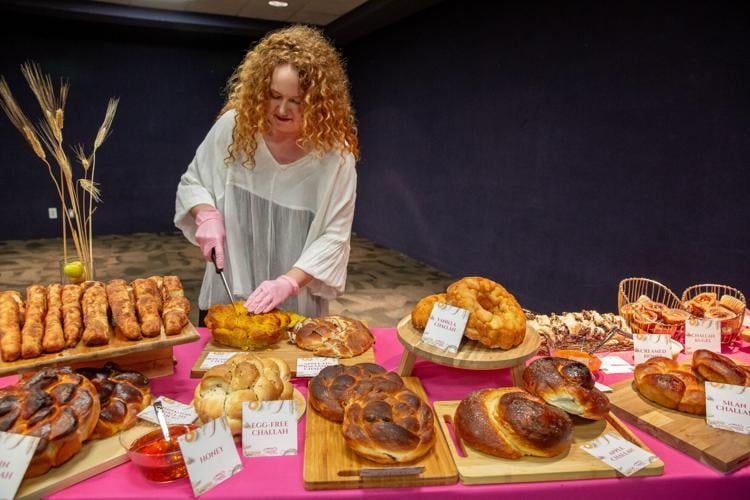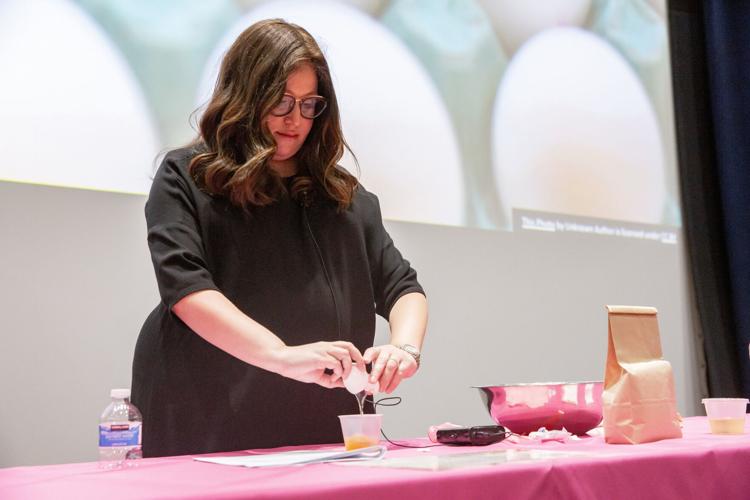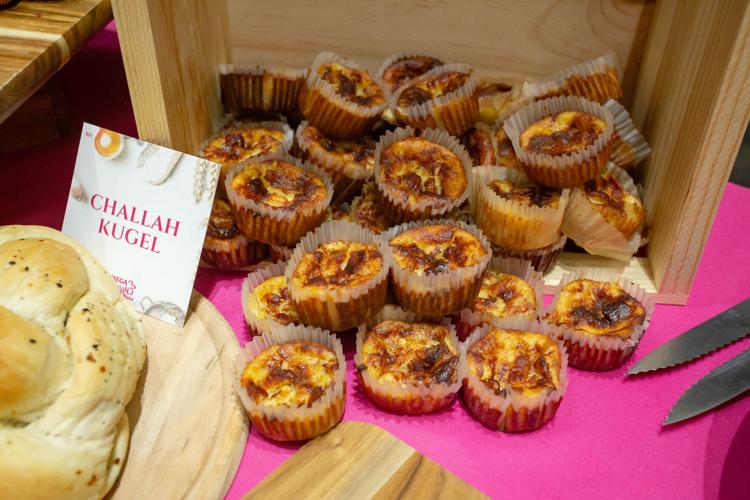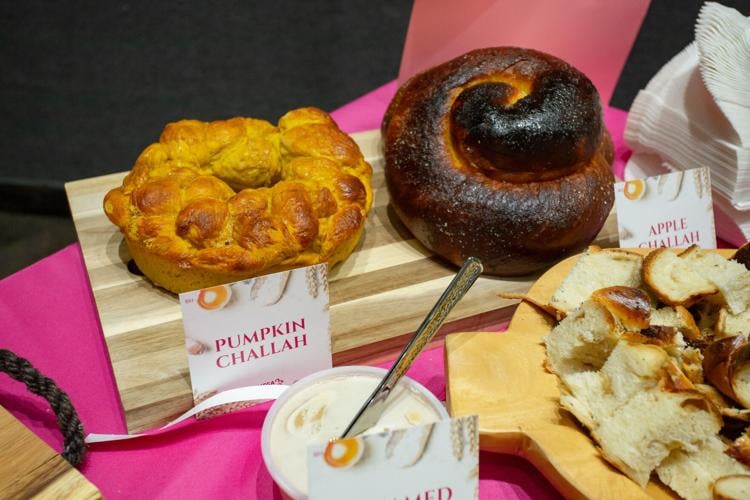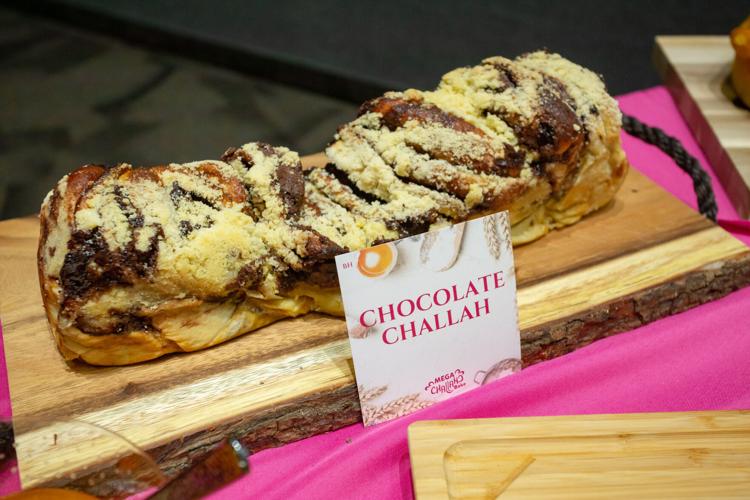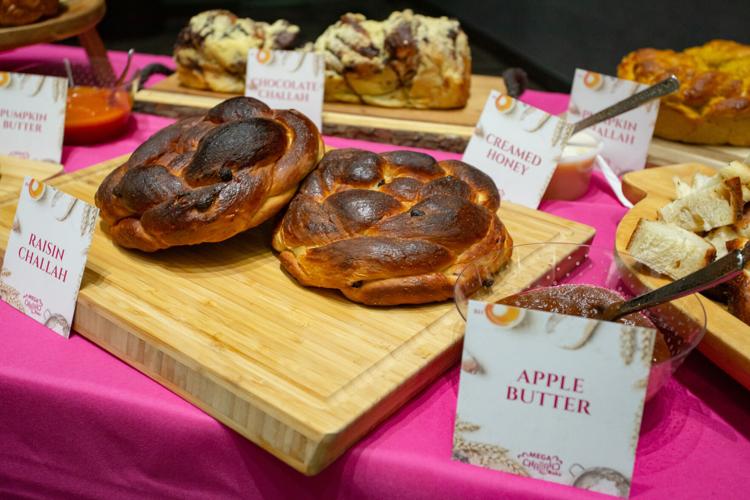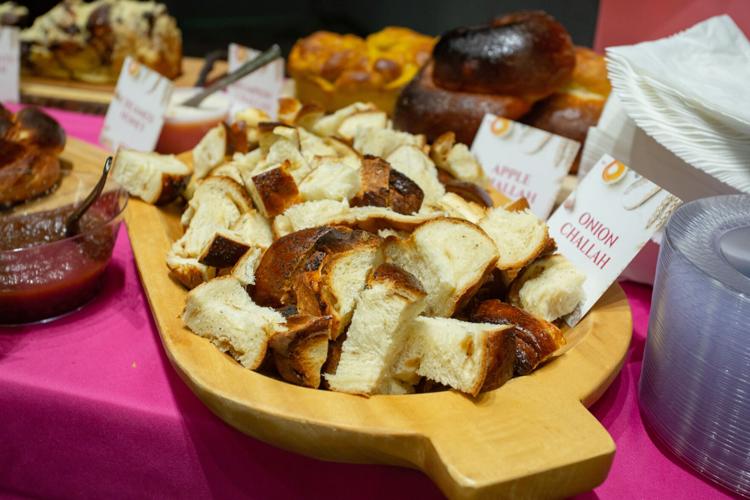When Chabad Tucson finds out that someone Jewish is moving to Tucson, they reach out and invite the person to Shabbat dinner at a rabbi’s house. Recently, Rabbi Yehuda Ceitlin made a call to welcome a woman named Nancy to share a meal at the Shabbat table. She picked up while in line for a rental car at the airport. Her plane had just landed.
“The notice was she already moved to (Tucson), but she literally just came to town,” Yehuda Ceitlin said. “A few hours later she was already at a Shabbat table, meeting people in the community. For her, it was the most beautiful welcome to town.”
Community leaders at Chabad Tucson, like Yehuda Ceitlin, have been inviting community into their kitchens since the organization was locally established in 1983. The tradition started with challah, a braided bread with a texture like brioche.

Vanilla challah at the 2019 Mega Challah Bake.
“The rabbi and his wife have been organizing and giving out challah personally to people for years as a gift, not just as friendship but as a point of connection,” Yehuda Ceitlin said. “Over the years they’ve hosted people at their house or at the synagogue or elsewhere for small bakes that brought specifically women together.”
While anyone can bake challah, only women can make it a mitzvah, or a holy act.
“A special blessing is said while making the challah,” he said. “This blessing cannot be said otherwise, (and) it’s said during the making of the bread. They take off a special piece of the bread and pledge it to G-d. We see that as a sacred time, when people have the opportunity to pray for good health for themselves, goodwill in certain areas of life. It’s a sacred area of life, and you see woman as having that power to commit the blessing, give blessing and be blessed.”
Feigie Ceitlin, Yehuda Ceitlin’s wife, started the Mega Challah Bake so women and girls could find community and feel pride in their Jewish heritage.

Feigie Ceitlin demonstrates how to make dough at the 2019 Mega Challah Bake.
“We have this sense of empowerment, this special mitzvah is for women and girls,” she said. “And we get to do it together as a community and show our Jewish pride. Hopefully, going into the new year, it can bring our community together in such a beautiful way.”
This year’s Mega Challah Bake marks the 10th anniversary of the tradition. The event will take place from 7-9 p.m. on Thursday, Sept. 14 at the Jewish Community Center, 3800 E. River Road. You can get discounted admission if you register online in advance.
“We try to hold it before the High Holidays when people are a bit more spiritually minded. We consider it as a preparation,” Yehuda Ceitlin said. “We encourage people (to) come to the event, we have all the ingredients ready for them, including utensils. They mix the dough, they knead, they braid and they take the challah home for themselves or their families, or share them with others.”
In addition to the religious significance of baking challah, this event includes a broader celebration of community.

Challah kugel from the 2019 Mega Challah Bake.
“Everybody is welcome,” Feigie Ceitlin said. “We put this together for the Jewish women, but we love it when people participate in any of our programs, when we put together a Passover Seder or any services. We welcome anyone in, bringing people in and sharing our traditions and religion.”
Food has compounded importance in Judaism, sacred both as a means of coming together and as a symbol itself.
“Food brings us together,” Yehuda Ceitlin said.
“Food brings us together. And we look at every major Jewish holiday, an essential component of it is the food aspect. We recognize that food is nutrition, physical nutrition, for the body, but it’s also soul nutrition.
“When we focus on what we eat, the preparation, the eating of it, we have that mindfulness and obviously enjoyment, but the mindfulness of what we’re eating and what it signifies, it has more meaning and serves a purpose.
“Take, for example, pomegranate seeds. You eat pomegranate seeds on a regular day, it’s exciting if you like it. But eat it on Rosh Hashanah, it signifies the many mitzvahs, the many good deeds you can do throughout the year. Eat gefilte fish on a regular Tuesday — it’s OK if you like it. But eat it on Shabbat, with a little horseradish, it (becomes) part of observing the sacred day of the week ... Food has been and is essential to Jewish practice.”

Pumpkin challah at the 2019 Mega Challah Bake.
To get through the pandemic, the Mega Challah Bake went virtual. Ingredients were delivered to participants’ homes and the bake became a family event. The whole household, across generations, participated in making the challah. This year, though the tradition has returned to highlighting Jewish women, the feeling of connection and heritage across generations continues.
“It was so exciting when my mother was baking challah and I got to participate,” Feigie Ceitlin said. “Going to my grandmother, I remember visiting her in New York, my mother got to know her recipe. It was a great thing that tied the generations together and the traditions together.
“As life continues, we get to (bake with) our children as well. Every Friday we get to bake with our daughters and make the special blessing,” she said. “I can’t wait to do it with my grandchildren as well.”

Chocolate challah at the 2019 Mega Challah Bake.
Despite food being central to Jewish traditions, and Tucson’s vibrant Jewish community, our city lacks a Jewish deli and other Kosher resources. My predecessor Andi Berlin started a list of Jewish foods in Tucson that I have updated over time. But Yehuda Ceitlin stressed the lack of truly Kosher restaurants in town.
“I would say that the Kosher scene in Tucson is constantly evolving,” he said. “There have been, back in the day there have been times when there’s a full-time Kosher deli. Back in the day there was more than one butcher in town. That has changed since. Today, we don’t have easily accessible meat in that sense. But I don’t think there’s a Jewish home in town that wants Kosher meat and doesn’t have access to it, thanks to Trader Joe’s and Costco. Al Basha as well, on Grant Road — these stores regularly carry Kosher meat of different options.”
While there are limited Kosher options — and a once-a-month popup bistro — at the JCC, Ceitlin said that Tucson lacks a full-service Kosher restaurant.
“The closest proper Kosher dining experience is Phoenix, if you’re up for it. Vegas, if you’re making a vacation out of it. Tucson does not have that ... You’re pretty much dependent on your kitchen, or a friend’s kitchen, if they’re friendly.
“Which, in a way, has its preferences, too. It means people are getting together and seeing each other. They get to know their neighbor, let alone others, a bit further,” he said. “This provides an opportunity to meet and eat, of course, and make connections, and build connections.”

Raisin challah at the 2019 Mega Challah Bake


